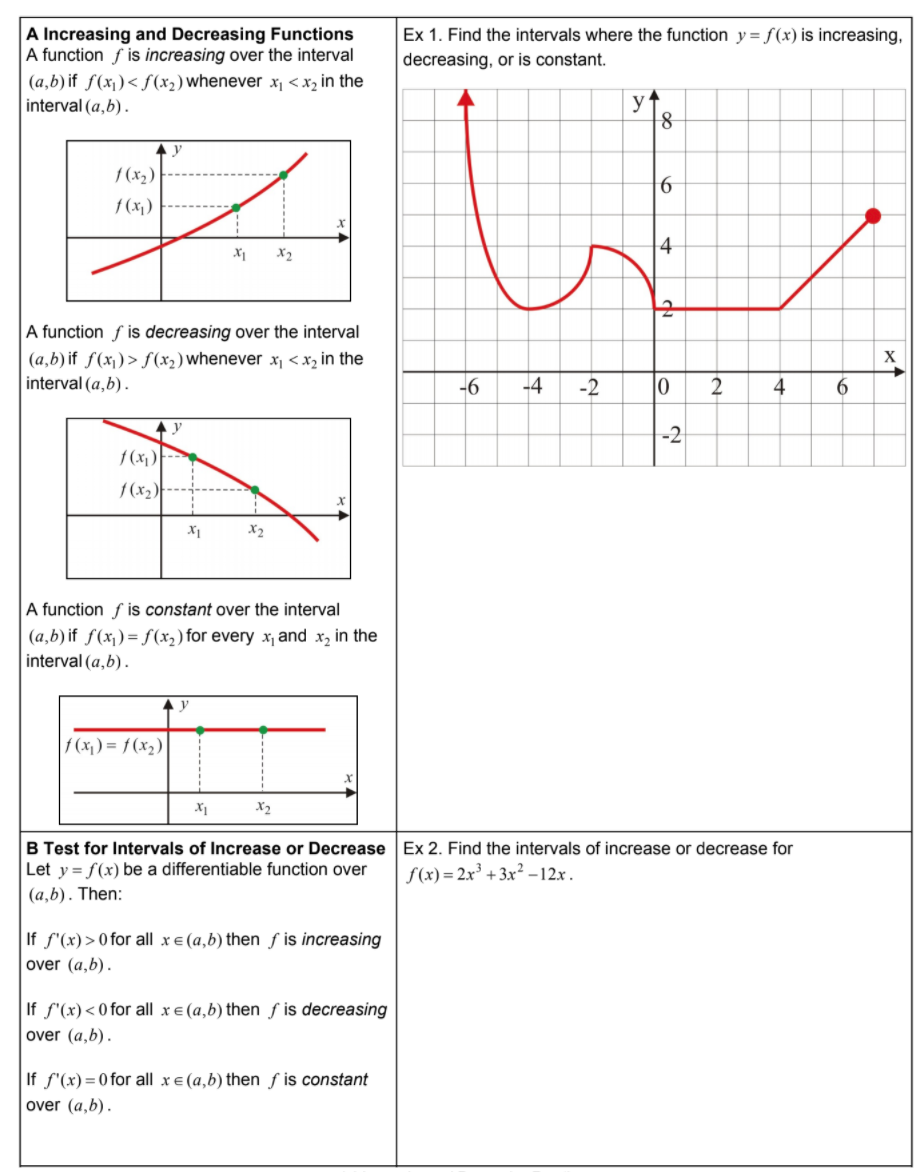Trigonometry (MindTap Course List)
10th Edition
ISBN:9781337278461
Author:Ron Larson
Publisher:Ron Larson
ChapterP: Prerequisites
Section: Chapter Questions
Problem 8PS
Related questions
Question
100%
please solve the example questions below with steps and explanations.

Transcribed Image Text:A Increasing and Decreasing Functions
A function f is increasing over the interval
Ex 1. Find the intervals where the function y = f(x) is increasing,
decreasing, or is constant.
(a,b) if f(x1)< f(x2)whenever x, < x2 in the
interval (a,b).
y
7 (x2)
7 (x1 )
X2
A function f is decreasing over the interval
(a,b) if f(x1)> f (x2) whenever x <x2 in the
interval (a,b) .
X
-6
-4
-2
2
4
6.
-2
f(x1)
7(x2) ---
X2
A function f is constant over the interval
(a,b) if f(x1)= f(x2) for every x, and x, in the
interval (a,b).
|f (x)) = f (x2)
X2
B Test for Intervals of Increase or Decrease Ex 2. Find the intervals of increase or decrease for
Let y = f(x) be a differentiable function over
((x) = 2x³ + 3x² –12x.
(а,b). Then:
If f'(x)>0 for all xe (a,b) then f is increasing
over (a,b).
If f'(x)< 0 for all xe (a,b) then f is decreasing
over (a,b).
If f'(x)= 0 for all xe (a,b) then f is constant
over (a,b) .
Expert Solution
This question has been solved!
Explore an expertly crafted, step-by-step solution for a thorough understanding of key concepts.
This is a popular solution!
Trending now
This is a popular solution!
Step by step
Solved in 3 steps with 1 images

Knowledge Booster
Learn more about
Need a deep-dive on the concept behind this application? Look no further. Learn more about this topic, calculus and related others by exploring similar questions and additional content below.Recommended textbooks for you

Trigonometry (MindTap Course List)
Trigonometry
ISBN:
9781337278461
Author:
Ron Larson
Publisher:
Cengage Learning

Algebra & Trigonometry with Analytic Geometry
Algebra
ISBN:
9781133382119
Author:
Swokowski
Publisher:
Cengage

Functions and Change: A Modeling Approach to Coll…
Algebra
ISBN:
9781337111348
Author:
Bruce Crauder, Benny Evans, Alan Noell
Publisher:
Cengage Learning

Trigonometry (MindTap Course List)
Trigonometry
ISBN:
9781337278461
Author:
Ron Larson
Publisher:
Cengage Learning

Algebra & Trigonometry with Analytic Geometry
Algebra
ISBN:
9781133382119
Author:
Swokowski
Publisher:
Cengage

Functions and Change: A Modeling Approach to Coll…
Algebra
ISBN:
9781337111348
Author:
Bruce Crauder, Benny Evans, Alan Noell
Publisher:
Cengage Learning


Algebra and Trigonometry (MindTap Course List)
Algebra
ISBN:
9781305071742
Author:
James Stewart, Lothar Redlin, Saleem Watson
Publisher:
Cengage Learning